Click here to Download the full Report
Methodology
This report provides some general trends and details of some significant incidents related to the repression of dissent in Sri Lanka in the month of September. An incident that happened on 31st August is also included as it is a serious incident and we had missed including it in our August report.
The report is based on 38 incidents related to repression of dissent in Sri Lanka. Section 1 describes the methodology. Section 2 describes the socio-political context and some trends relating to human rights situation in Sri Lanka during the month. Section 3 provides updates about ongoing legal cases related to dissent. Section 4 provides a thematic summaries of the incidents described in the report. This month’s report is organized under 6 themes: (4.1) free expression, (4.2) Repression of memorialization for war time events (4.3) Repression of civil society, (4.4) Repression of State officials, (4.5) Legal, Policy, institutional actions, and (4.6) Other incidents.
4.1 Repression of Free expression
Sri Lanka Press Council operating under the Ministry of Mass media, established under the Press Council Act No 5 of 1973 published an advertisement asking to register the newspapers which are unregistered under them, while the advertisement also mentioned that legal action will be taken against the unregistered newspapers and magazines in the future. The Press Council has been long defunct. It had given authorities a great deal of control over the media in the past, was subjected to strong criticisms of media activists and journalists. The independence of the institution and its political alliance to the ruling government has been historically critiqued by media activists. Though the former government attempted to revive press council in 2015, the action was withdrawn due to strong opposition from the civil society and media activists.
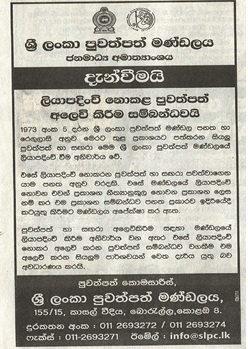
Lakmal Baduge: a journalist in Uppuveli in Trincomalee district has been threatened with death and his mother has been assaulted and hospitalized after he complained about an illegal construction. Since the attackers are also allegedly connected with drug trafficking, the journalist claims that the articles he wrote about drug trafficking in the area might have also offended them. Two journalists of Mawbima newspaper made a complaint to the Borella Police station regarding an attempted assault on them at a Media briefing organized by an NGO.

Three incidents were reported from three different districts in which journalists have not been allowed to attend meetings of public interest, which they were allowed in the past. In Wanathawilluwa in Puttalam district, journalists were not allowed to attend a meeting in which Minister of Wildlife & Forest Conservation attended and had a discussion with government officers concerning an incident of deforestation in the area. However, in the recent past, government failed to provide an adequate response to a wave of incidents relating deforestation reported around the country. When inquired about the reasons of not allowing media coverage, the Minister has responded saying that certain things discussed in the meeting were confidential. The Chief Government Whip, Johnston Fernando announced that the proceedings of the Committee on Public Enterprises (COPE) will not be open to the media in order to protect government officials and former officials since “video footage could be edited to promote certain political agendas.” Journalists were not allowed to attend Kurunegala district coordinating committee meeting despite of prior written and verbal invitations sent by the District Secretary. The journalists were invited and allowed to provide media coverage in previous meetings. It was also attended by several MPs including two state ministers.
During remembrance events held in North and East, intelligence personnel in civil clothes standing behind journalists have recorded individual statements given to media by people, causing intimidation to people and obstruction to journalists and civilians who spoke to media. Police have allegedly supported intimidation by allowing this to happen despite of opposition expressed by the journalists.
A farmer who spoke to media exposing information about an illegal stone quarry located in irrigation tank’s reserve area in Tissamaharama in Hambantota district has been threatened with death by the owner of the quarry.
4.2 Repression of memorialization of war time events

Several magistrate courts banned commemorative events organized by Tamil civilians, organizations and political parties in the North and East in memory of Thiyagi Thileepan, former LTTE leader who died during a hunger strike in September 1987.
In Jaffna district, Jaffna magistrate court banned a commemorative event remembering Thileepan. Police initially informed the court that event should be banned due to the COVID-19 spread. However, when the decision was challenged on the next day, then Police has argued that the event cannot be allowed since the commemoration was to glorify the LTTE. In Ampara District, the Sammanthurai Magistrate issued an injunction order prohibiting Memorial Day meeting and procession for Thileepan based on petition filed by Sammanthurai Police. The Point Pedro Magistrate Court also issued a court order against attempts to conduct a token fast in view of commemorating Thileepan. Police has obtained a 14-day court order banning all protests, hartals in North and Eastern Provinces in commemoration of any LTTE member according to Daily News government news website.
A hartal was launched in the North- East by several political parties and civil society groups on 28th condemning the Government’s actions preventing the commemoration of those killed during the war. However, military and Police have intimidated shop owners in an attempt to break the hartal organized across North and East. In Achuveli area in Jaffna, military and Police have threatened shop owners demanding to reopen the shops according to Nirosh, a member of the Vali East Pradeshiya Sabha. He further told the media that he has been also threatened by the military, when he spoke to the shop owners.
Police seen entering Vavuniya’s Bazar and ordering for stores to be reopened using loudspeakers. Photo courtesy: Tamil Guardian
Former Northern Provincial Councillor, M.K. Sivajilingam was arrested by the Jaffna Kopay Police for holding a memorial service for Thileepan in violation of the court order issued by Jaffna magistrate. He was charged with contempt of court and later granted bail.
In Vavuniya, Police had denied permission for commemoration march to remember Thileepan. Police have summoned the Batticaloa Organiser of the Tamil National People’s Front (TNPF) over attempts to commemorate Thileepan’s fast unto death. Police have blocked the entrance of university students into the University of Jaffna, when a group of students clad in black dresses visited the University in attempt to commemorate Thileepan inside university premises.
4.3 Repression of civil society
Director of National Secretariat of NGOs Raja Gunaratne has told Sunday Observer, and Silumina government owned newspapers that “some NGOs pose a serious threat to national security, spreading extremist ideologies. And discussions are underway to draft a new Act to overcome these drawbacks.” The news also mentioned that “it has been reported that of Rs. 50,000 million received by local NGOs, a large amount has been spent on anti-national activities and disseminating extremism in the country. The largest slice of foreign largesse has been channelled into the country via 280 NGOs.” Raja Gunaratne also alleged that only 20% of funding has been spent by NGOs on project activities, while 80% has been spent on their personal budgets.

On 30th September, two military officials have allegedly threatened the Head of the Mullaitivu Missing Persons’ Association, Mariyasuresh Easwary at her house and demanded information about a protest scheduled to be conducted on the following day in commemoration of Children’s Day. She has been previously subjected to various threats and intimidation including an assault by unknown persons in 2017.
On 19th September, Divaina newspaper publishing a news article alleged that Global Tamil Forum (GTF); British Tamil Forum (BTF); National Council of Canadian Tamils (NCCT); Tamil Youth Organization (TYO); World Tamil Coordinating Committee (WTCC); Canadian Tamil Congress (CTC); Australian Tamil Congress (ATC); Tamil National Council (TNC) have been raising funds from Tamil diaspora in order to revive LTTE. The news article also said that this occurred as a result of the former government’s decision to delist these organizations from the list of individuals and organizations linked to terrorism by previous government.

During the court hearing in Fort magistrate court against Human Rights activist Hejaaz hizbullah who is currently under the arrest, CID accused that well known charity organization Qatar Charity is a “terrorist funding entity” and had been listed as a terror network. Deepani Menike, appearing on behalf of the CID said that offences related to receiving funding from terror organisations and the Money Laundering Act are being investigated. The counsel representing Mr. Hizbullah told court that a simple search on Google would have cleared any ambiguity as to what “Qatar Charity” was. He said the Charity works closely with the Sri Lankan government, the United Nations and UNICEF and many other international organistions.
4.4 Repression of State officials
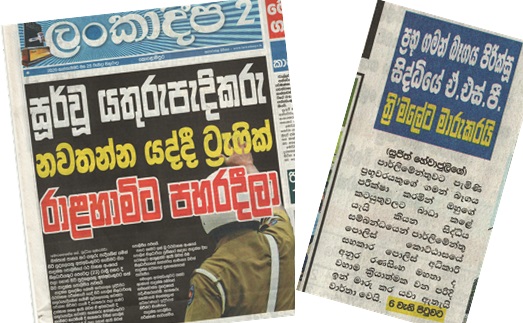
Courtesy: Lankadeepa newspaper
On 9th of September, in Atalugama area in Kalutara district, four individuals including three females have been arrested over alleged assault on several police officers in Atalugama, Bandaragama. This has occurred when a team of officers from Bandaragama Police had carried out a raid at a house regarding a cannabis racket. Two Sub-Inspectors, a Woman Police Sergeant and a Woman Police Constable were reportedly injured in the attack. Later more suspects were also arrested. On 20th September, a person connected with the same incident who attempted to escape from Police arrest, while trying to attack with a knife was arrested by Bandaragama Police. A drunken driver has assaulted a Police officer on traffic duty when the officer has attempted to arrest the person. The incident occurred in Padukka divisional secretariat area in Colombo District. Assistant Police Superintendent Anura Ranasinghe, Parliament Police OIC K.L. Liyanage and two other Police officers worked at Parliament premises have been transferred for allegedly causing inconvenience to a VIP by checking their baggage, while entering into the parliament premises.
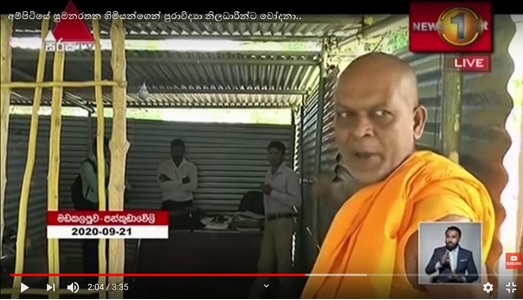
Photo courtesy: Newsfirst
In Batticaloa, controversial monk Venerable Ampitiye Sumanarathana Thero has threatened officials of the Department of Archaeology in the presence of the media saying their delay to demarcate an archeological land has resulted in part of the land being acquired for cultivation. He also physically assaulted the officials, and forcefully kept them inside a hut threatening them with death demanding not to leave until they bring their senior. A legal case has been filed against the monk.
On 25th of September, President Gotabaya Rajapaksa asked the state officials to treat all his verbal orders as circulars to be implemented. “Those who neglect this will face stern action” President also said. He made this statement during a discussion with Villagers at Velanwita village in Haldummulla, Badulla. Later he also issued the same statement through the official President’s website. Asking to consider a verbal order as a circular could have detrimental effects on freedom of dissent. A verbal order could be unrecorded, and sometimes could contravene with the existing laws, policies and other measures. Retired intelligence officer Ranbanda – a key witness of journalist Prageeth Ekneligoda abduction case, Aiyasami Balasubramaniam and S.M. Ravindra Rupasinghe two accused of the same case made statements before the PCoI on Political Victimization, that they had been threatened by CID officials to provide false statements. While the PCoI hearing and the legal case pertaining to the alleged abduction of journalist Ekneligoda are still ongoing, the overall trend might discourage investigation officials from undertaking controversial legal cases in which politicians and military personnel have been involved.
4.5 Legal, Policy, institutional actions
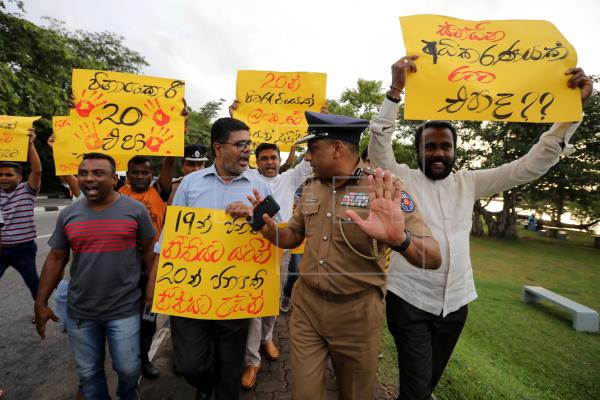
The 20th Amendment to the Constitution Bill (“proposed Amendment”) proposed in this month[1] removes many positive changes introduced to constitution in 2015, and reintroduces much of what was in place under the 18th Amendment to the Constitution, in 2010. 19th Amendment sought to reduce the powers of the Executive President, and make him/her more accountable to Parliament and the Courts, and also improved the independence of several commissions, by, among other things, depoliticizing the process of appointing members. Under 20th Amendment, members to the independent commissions, and other key positions will be appointed by the President, leading to more politicization. It will also affect the law making process by reducing the time period during which the public has access to Bills before they are passed, and reintroduces the urgent Bill process. Current constitution does not allow to challenge existing laws after they were passed by the Parliament. Hence introduction of twentieth amendment could have number of negative impact on the freedom of dissent. Government and opposition politicians, civil society, media organizations, clergy, academics and many others have expressed their disagreement with the proposed amendment and also some have filed fundamental rights petitions against the 20th amendment. It also weakens the transparency of audit, procurement, and anti-bribery functions in Sri Lanka.
On 7th September 2020, speaking at a public event, Minister of Justice Ali Sabry denigrated the function of independent commissions and asked “can we eat commissions? What’s the use of them if they cannot reduce the number of crimes?” In a context, where government attempting to introduce 20th amendment that has clear negative impact on independent commissions, this statement by the Minister of justice seemed as a further warning that the government might reduce resources, or take other actions to weaken the functions of independent commissions.
On 28th September, Presidential Secretariat issued a statement saying “A fake news campaign that alleges unprecedented environmental destruction is taking place since the present government came into power has now been identified. The government has decided to take stern legal action against the parties or individuals who intentionally feed misinformation and mislead the public abusing various forms of media.” The statement also said “Fake news about environmental destruction being disseminated especially on social media platforms and in some print, television and radio media. The statement highlighted a single incident of fake news, and attempted to generalize other incidents of deforestation reported by environmentalists and public and to intimidate them with a threat of legal action.
President issued the gazette calling for armed forces same as in the previous months. The involvement of armed forces in civilian activities is considered with fear by those who have dissenting views and engaged in dissenting actions with the government and critical of militarization.
Defence Secretary Kamal Gunaratne has told that the Ministry of Defence had assured the University Grants Commission (UCG) that the SIS and “other state Intelligence agencies” would be provided to help end ragging in the universities. Under the arrangement security marshals would coordinate with the intelligence services by sharing information and arrest offenders with the help of the police. However, INFORM believes that Universities are required to take other actions and strategies in order to mitigate ragging in Universities without bringing military intelligence into the University Premises. This action could have strong negative impact on the freedom of dissent inside university premises, could weaken both activism of students and university teachers, and academic freedom.
[1] It was passed in the following moth with few amendments.
4.6 Other incidents
On 24th September, Speaker of the Parliament denied the opportunity of raising a question about Thileepan commemoration at the parliament by the leader of AITC, MP G.G. Ponnambalam claiming that is a matter which under adjudication by a Court of Law. Even though MP Ponnambalam raised a point of order saying that the question is not about an ongoing legal case, but about a concluded case, Speaker still denied the opportunity.
On 8th September, Vice President of Ukuwela Pradeshiya Sabha in Matale District, Abdul Nizar (UNP) has been assaulted when a resident in the area has been informing him of a sand mining incident and then a party involved with sand mining has assaulted him.
On 25th September a villager who informed Police regarding a group of people involved with cannabis trade was attacked in Kanthoduwawa area in Mandurankiuliya in Puttalam District. The villagers organized a protest against the incident.
Government controlled print media institution, Lakehouse has interdicted four journalists just for simple typographical error (one letter) in writing President Gotabaya’s name ගෝඨාභය as ගෝඨාබය. While this seems as a disciplinary action, it could also create fear among journalists to impose a self-censorship in writing content critical of government or President.

The Committee on High Posts of the Sri Lankan Parliament has approved the appointments of 08 diplomats including former alleged death squad member C. A. Chandraprema as Sri Lanka’s permanent representative to the United Nations in Geneva. Civil society activists have pointed out forcing human rights activists, survivors, families of victims to deal with a person with such a negative record of human rights abuses could bring fear and intimidation, while it is also questionable in terms of accountability.
Click here to Download the full Report
5. Statistical analysis
Total 38 of incidents were reported in this month.
| Type of violation | Number | Percentage |
| legal, institutional and policy | 8 | 21% |
| physical attacks | 6 | 16% |
| Court order | 4 | 11% |
| Restrictions to journalists and media | 3 | 8% |
| Death threats | 2 | 5% |
| Intimidation | 2 | 5% |
| Arrest | 1 | 3% |
| police questioning | 1 | 3% |
| Others | 11 | 29% |
| Total | 38 | 100% |
21% of these incidents were legal, institutional and policy decisions that could negatively impact on the freedom of dissent. 16% incidents ere relating to physical attacks. 11% were court orders issued against holding memorialization events in the North and East. 8% of incidents were related to restrictions on journalists where they were not allowed to cover state events that they were previously allowed to. There were also 2 incidents of death threats, 2 incidents of intimidation including a visit to a house of an activist by military in the night, an incident of summoning and being questioned by Police, and an arrest.
| Geographical area | Number |
| Colombo | 5 |
| Gampaha and Kalutara | 2 |
| North and East | 13 |
| Other areas | 5 |
| Not Applicable | 13 |
| Total | 38 |
34% of incidents were reported from Northern and Eastern Provinces. 13% of incidents were reported from Colombo District in Western Province. 6% of incidents were reported from Gamapaha and Kalutara remaining two provinces in Western Province. While 13% of incidents were reported from other areas, in 34% of incidents the geographical areas were not applicable since they were legal, policy actions that could affect multiple geographical areas.
| Type of victims | Number | Percentage |
| Journalists | 8 | 21% |
| Protestors and participants of memorial events | 8 | 21% |
| State officials | 8 | 21% |
| Civil Society Activists and NGOs | 4 | 11% |
| Politicians | 3 | 8% |
| Whistleblowers | 2 | 5% |
| Other | 5 | 13% |
| Total | 38 | 100% |
Type of victims included 21% of journalists, 21% of participants of memorials events and 21% of state officials. 11% were civil society activists and NGOs. 8% were politicians, while 5% were whistleblowers who provided information to media and Police. There were 13% of other incidents.
| Ethnicity of the victim | Number |
| Sinhala | 9 |
| Tamil | 14 |
| Muslim | 2 |
| Not Applicable | 13 |
| Total | 38 |
Ethnicity was applicable in 25 of the cases. In more than 50% of those incidents, victims were Tamils. In 36% of cases victims were Sinhala, while 8% were Muslim.
| Victim’s gender | Number |
| Male | 13 |
| Female | 1 |
| Not Applicable | 24 |
| Total | 38 |
Gender was applicable in 14 of the incidents. In 93% of the incidents victims were men, while 7% of the incidents (1 incident out of 14), it was female. Gender was considered not applicable when it affected both men and women.
| Alleged Perpetrator/ Responsible party | Number | Percentage |
| Military or Police | 7 | 18% |
| State Institutions and officials | 5 | 13% |
| President or central government | 5 | 13% |
| Other government Politicians | 5 | 13% |
| Court | 5 | 13% |
| Business persons | 2 | 5% |
| Drug traffickers | 4 | 11% |
| Others | 5 | 13% |
| Total | 38 | 100% |
Alleged perpetrators were mainly linked to the state. They were mainly state officials related to Police or military, or court orders, other state institutions and officials, President, government or politicians. In 18% of incidents, alleged perpetrators were military or Police, while 13% of incidents they were state institutions and officials. In 26% of the incidents, allegedly responsible party was government or politicians linked to ruling government. In another 13% of the incidents in court was allegedly responsible. Drug traffickers were responsible for 11% of incidents, while persons involved in other illegal business were allegedly responsible for 5% of incidents. There were 13% of other incidents.

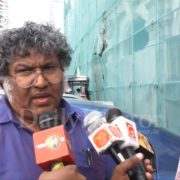
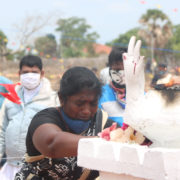
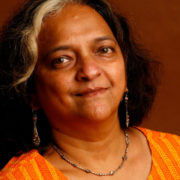
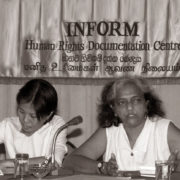
Comments